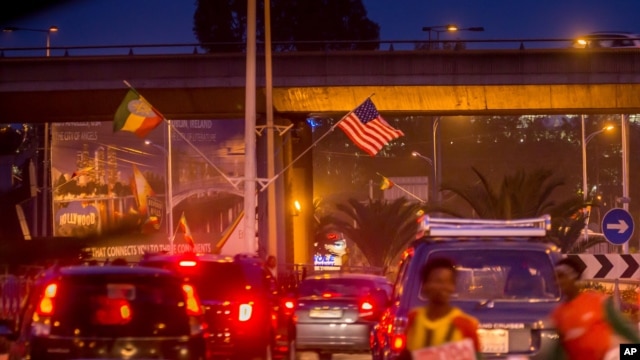An Ethiopia national flag, left, is seen next to a U.S. flag, center, in a busy street ahead of U.S. President Barack Obama's visit to Addis Ababa, Ethiopia, Saturday, July 25, 2015.
July 26, 2015 8:38 AM
ADDIS ABABA—
Ethiopia did not roll out the red carpet when a little-known U.S. senator decided, in 2006, to visit a flood-stricken rural town and pledged to lobby for aid from the U.S. military.
Nine years later, as president of the United States, Barack Obama is being welcomed with pomp and excitement in the nation that made such a strong impression on him as a junior senator.
Until Sunday morning, the only sign of his impending arrival in this security-conscious diplomatic capital were heavily armed federal police stationed on every major road. Local police also set up roadblocks and conducted vehicle searches and pat-downs on drivers and passengers.
But on Sunday afternoon, American flags began to pop up on Addis Ababa’s main Bole Road thoroughfare, alongside posters bearing Obama’s smiling face.
WATCH: VOA's Anita Powell previews President Obama's visit to Ethiopia
Serious agenda in Ethiopia
Obama is getting a very different reception here than in his ancestral homeland of Kenya, where the preparations for his visit started weeks ago, and where presidential paraphernalia mushroomed on street corners.
Fittingly, Obama brings a very serious agenda to Ethiopia: terrorism, development and investment are dominating his discussions with Ethiopia’s government and with leaders at the African Union.
Ethiopia has long been praised for its rapid, double-digit economic growth, for its efficient use of international donor funds and for its success in keeping Somalia’s al-Shabab extremist group at bay. Al-Shabab strikes often in its home country of Somalia, and has also hit targets in neighboring Kenya and as far afield as Uganda. But Ethiopia, which shares a long border with Somalia, has managed to stave off attacks.
Some critics of the government – among them, more than a dozen imprisoned journalists and bloggers – say this security often comes at the expense of their civil liberties and human rights.
The U.S. State Department’s human rights report on Ethiopia reads like a laundry list of violations, starting with “restrictions on freedom of expression … restrictions on freedom of association, including through arrests; politically motivated trials; and harassment and intimidation of opposition members and journalists,” and progressing to more severe crimes like “alleged arbitrary killings; alleged torture, beating, abuse, and mistreatment of detainees by security forces; reports of harsh and at times life-threatening prison conditions; arbitrary arrest and detention; detention without charge and lengthy pretrial detention; a weak, overburdened judiciary subject to political influence.”
WATCH: Rights Groups Decry Treatment of Media in Ethiopia
Ethiopians mixed on Obama
Many residents of Addis Ababa, when approached by VOA, said they had no opinion on Obama’s visit. Critics of Ethiopia’s government say free expression is often stifled or punished by authorities.
“I’m not a politician,” shrugged one young man, “you cannot ask me these questions.”
Others agreed only to speak off-camera, saying they are disappointed in Obama – a common refrain in Africa, where many citizens say they expected more from the first American president of African origin.
Other Addis Ababa residents said they did not agree with Obama’s stance on gay rights – here in conservative Ethiopia, homosexuality is illegal.
But others said they were hopeful about his visit.
Information technology manager Samson Kiflom demurred before deciding what he wanted to see from the American president, saying more cooperation with the American IT industry would be nice.
But his biggest wish?
“Maybe better freedom,” he ventured. “Not technology, actually – better freedom.”
And bank employee Melaku Alameru echoed concerns from government critics that Obama’s carefully choreographed trip would shield him from the often harsh realities of life for many Ethiopians.
“The president shall see whether the development of Ethiopia is real or not and whether the government is true or the opposition is true,” he said. “... The government is saying that human rights are respected and the opposition are saying that not respected – rather the government is denying the human rights of Ethiopia.”
After speaking to Melaku, VOA was ordered by Addis Ababa police to stop filming and immediately leave the area.


No comments:
Post a Comment